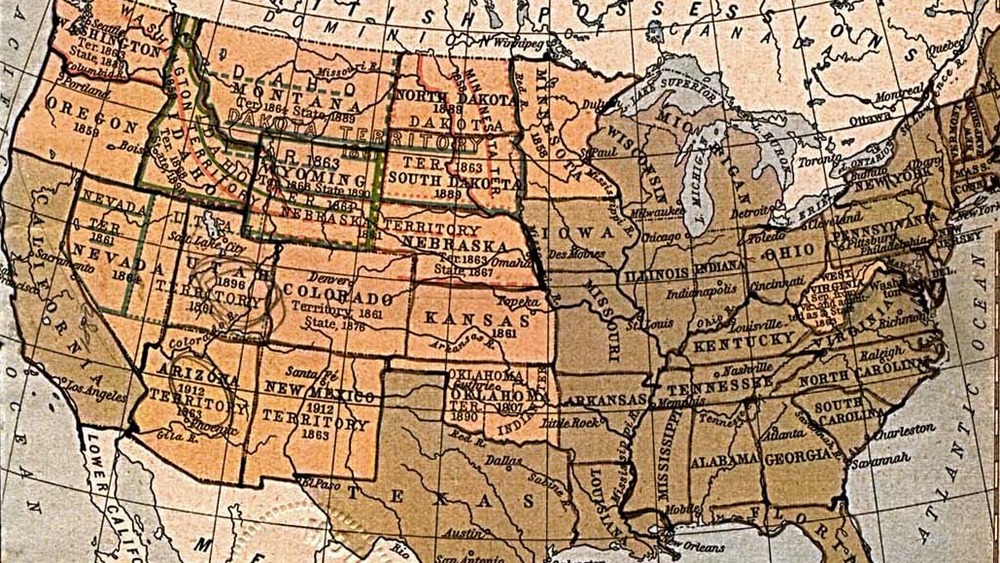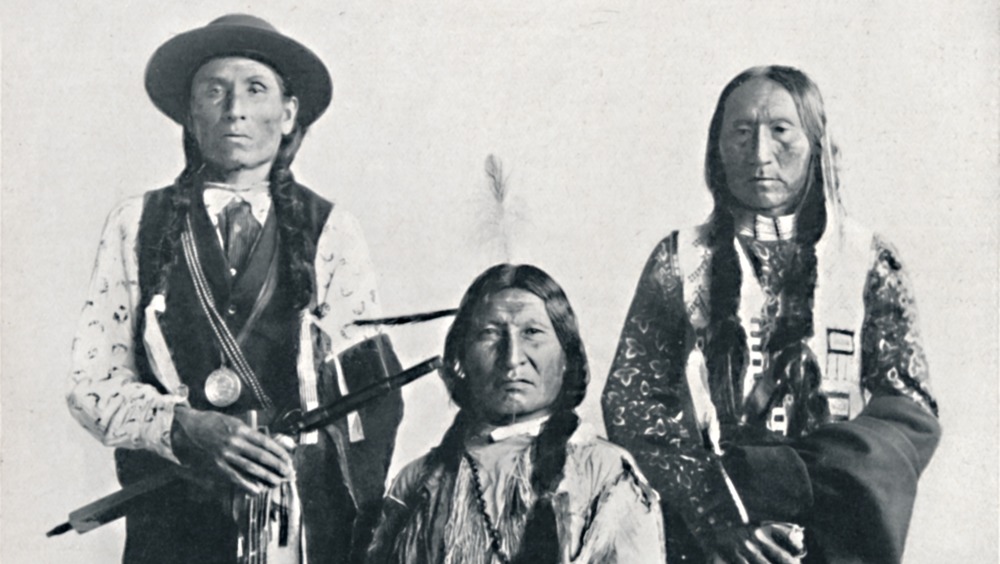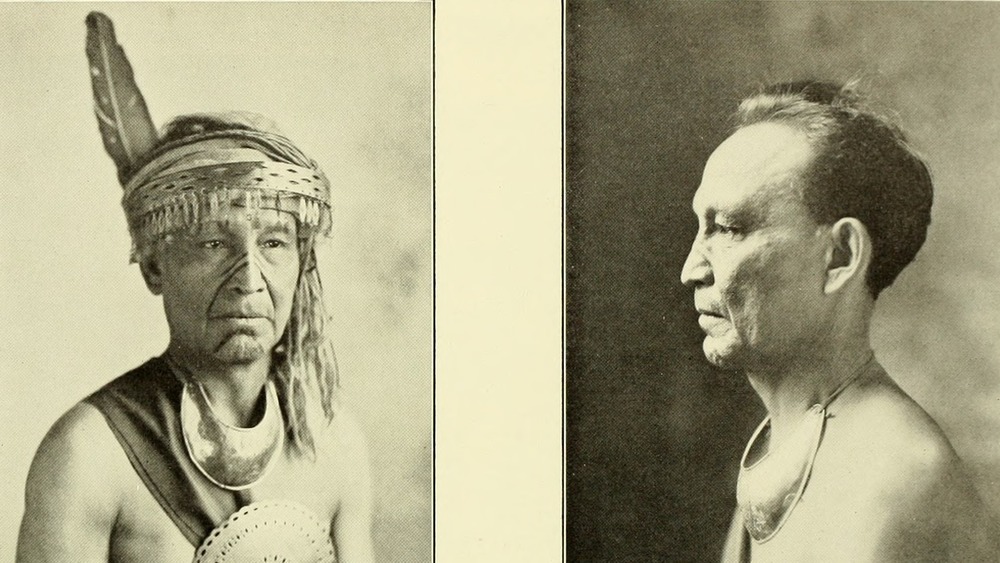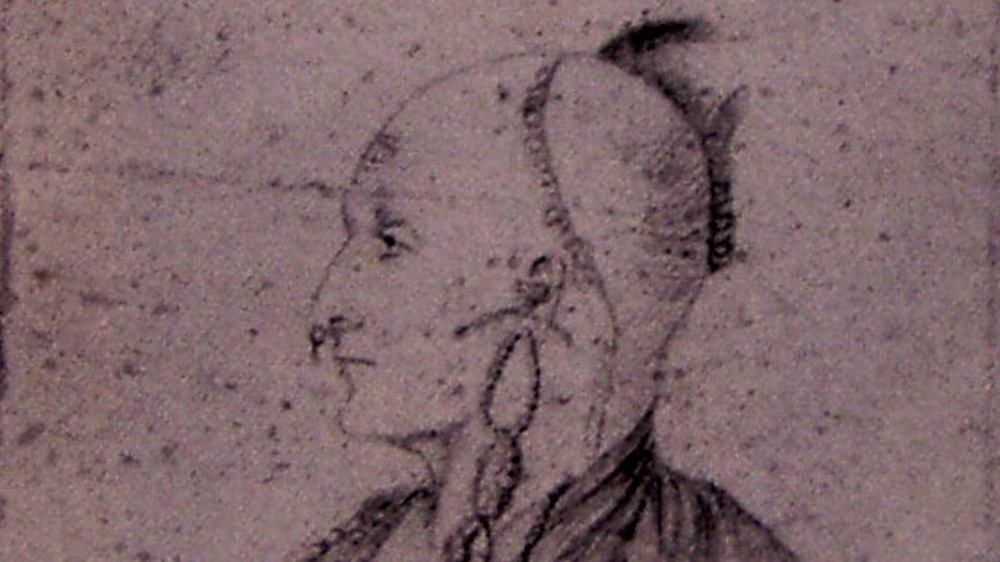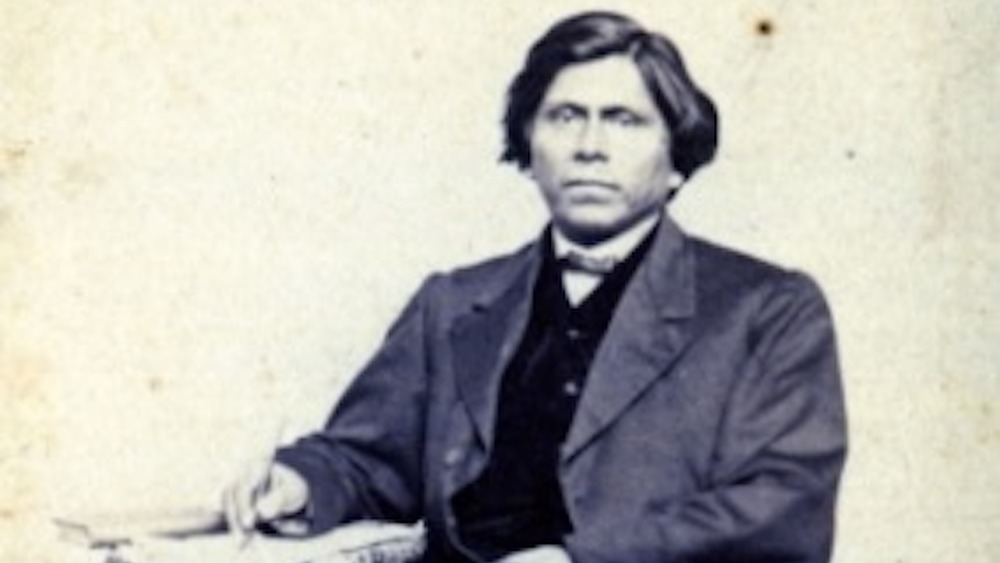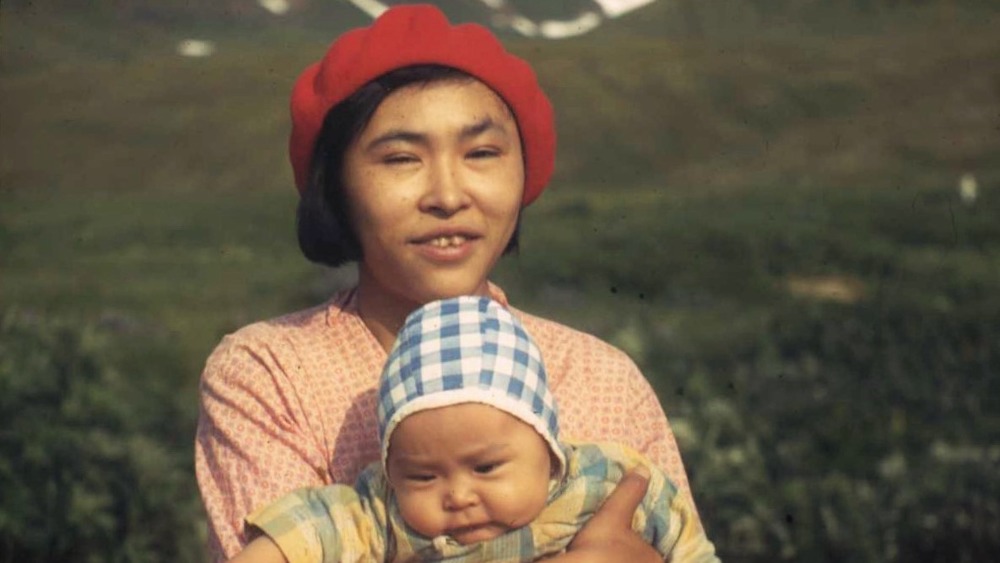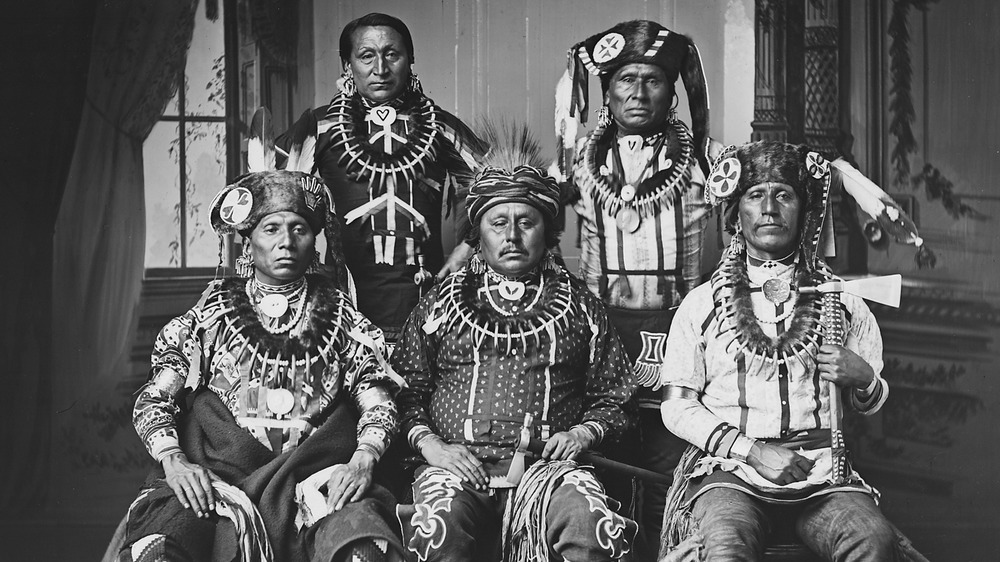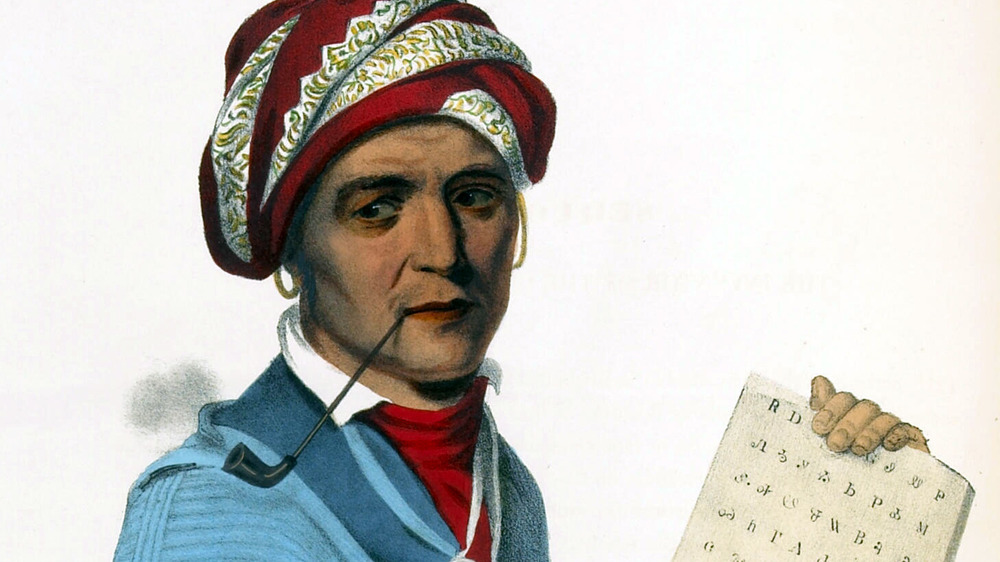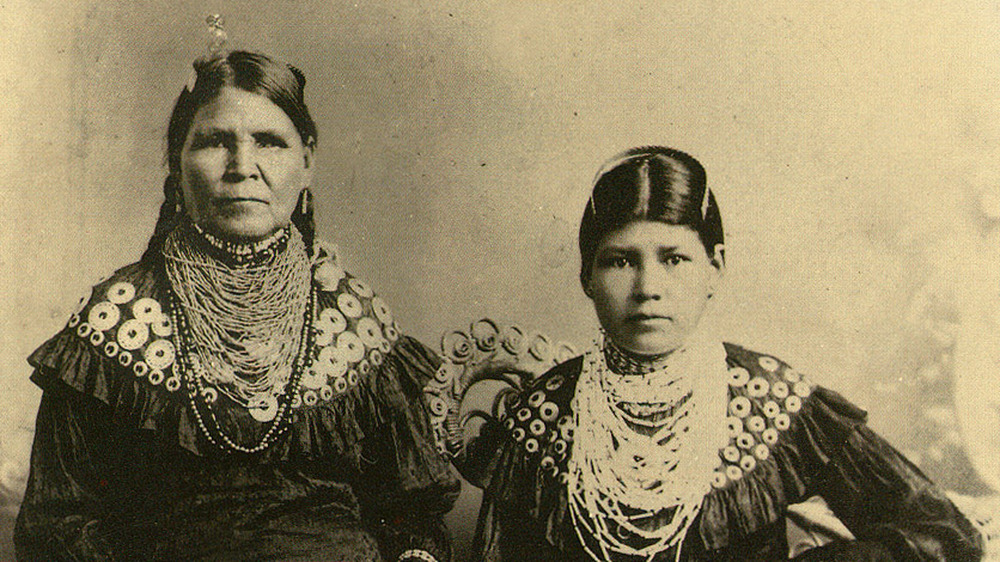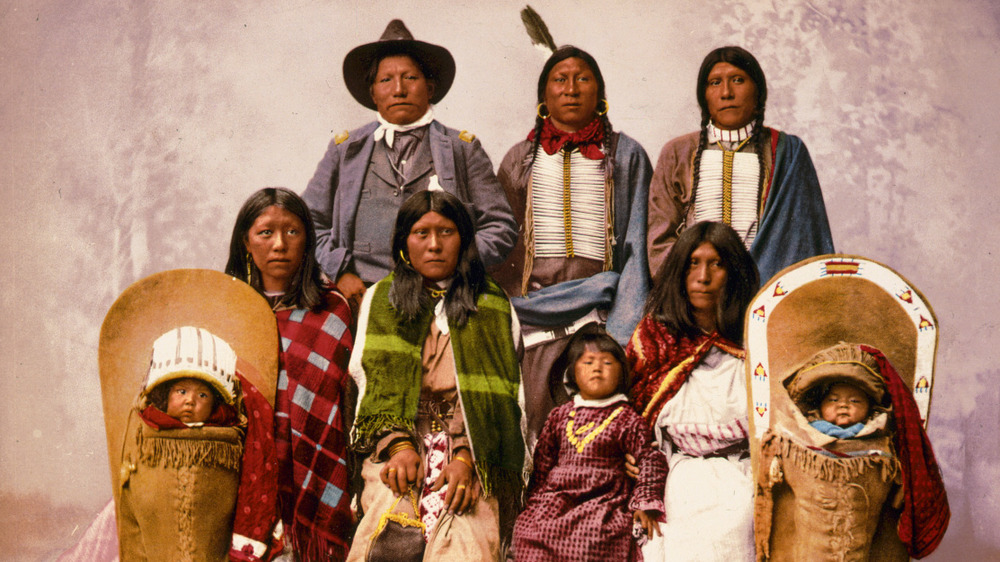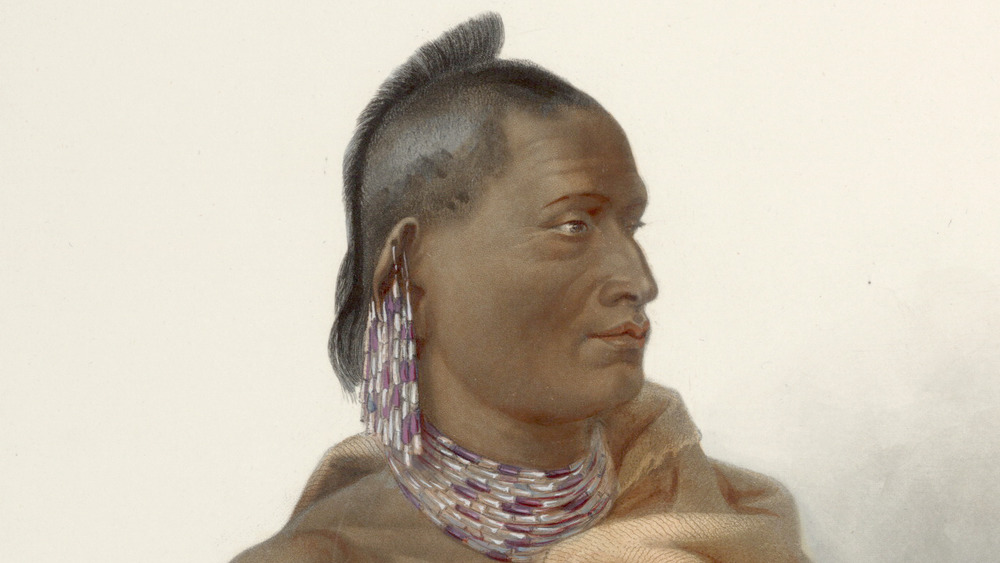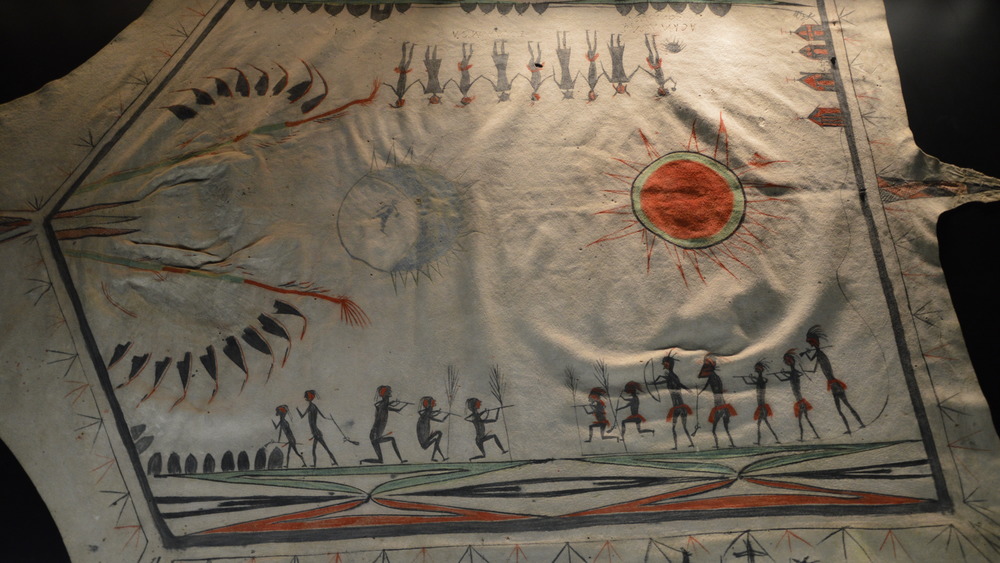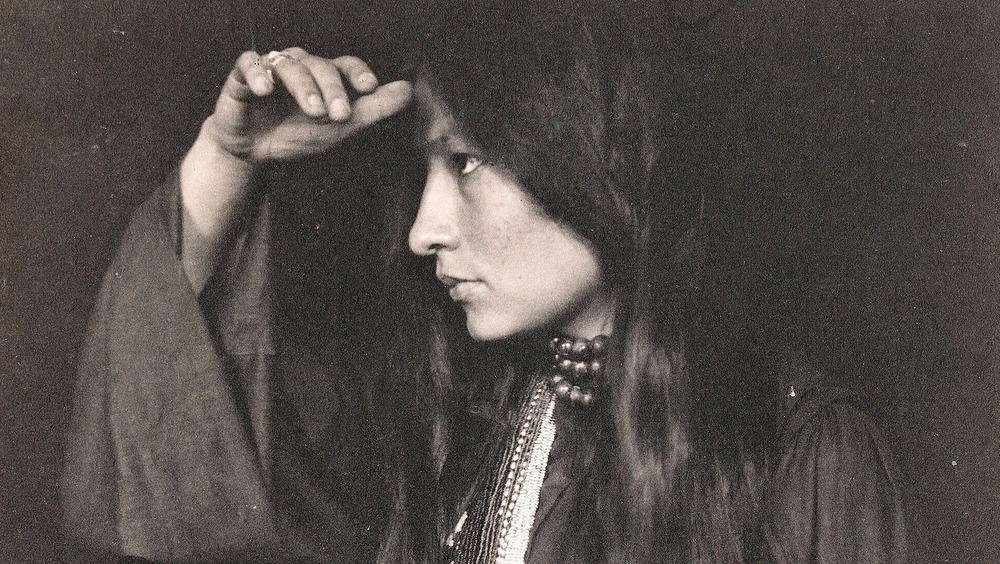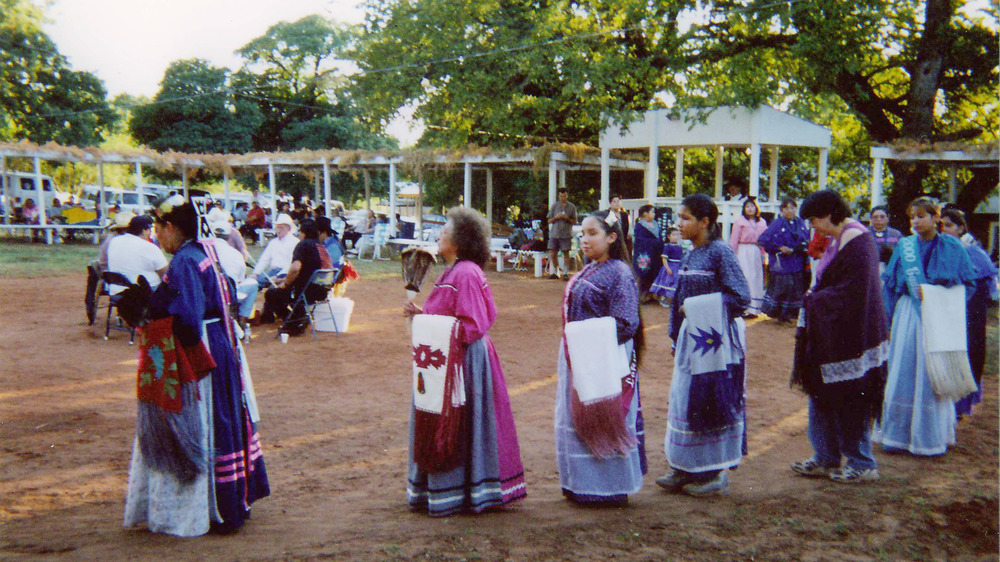State Names That Come From Native American Words
It's weird to think that while white colonizers were actively trying to exterminate the Native people of North America, they were simultaneously using various Native languages to name their claimed territory. In total, there are at least 28 state names with Native linguistic origins, and there are countless other cities, rivers, and geographic landmarks that bear names with a Native root.
The United States government also has named military equipment after Native tribes, claiming that it's a sign of respect. As Simon Waxman notes, "Identifying our powerful weapons and victorious campaigns with those we subjugated serves to lighten the burden of our guilt. It confuses violation with a fair fight." From its onset the United States government sought to forcefully assimilate and suppress Native people and culture into white culture. In that light, the wholesale use of Native languages and linguistics is contradictory to this supremacist vision.
Many of the tribes and languages from which the state names originated were almost completely wiped out by the genocidal campaign, and ultimately, a linguistic root that few can recall is small consolation. Here are some state names that come from Native American words.
Massachusetts: 'Near the great hill'
Colonized in 1630, Massachusetts, one of the first 13 British colonies, was named after the Massachusett tribe that lived along what is now known as the Massachusetts Bay. Taken from the Massachusett language, which is part of the Algonquian language family, "Massachusett" translates to "near the great hill," according to Mental Floss, named after the Blue Hills outside Totant, or what is now known as Boston. And to this day, several towns and cities in the state of Massachusetts continue to bear their Massachusett names, such as Natick, Monponsett, and Saugus.
In the 17th century, the tribe numbered around 3,000 individuals, but according to The Massachusett Tribe, a 1784 census numbered the tribe at 32 women and 21 men. By 1857, this number had dwindled to six women and 10 men.
The Massachusett weren't the only tribe that lived in what is now the state of Massachusetts. Around 1600, the land was also home to the Nipmuc, Wampanoag, the Nauset, and the Pocomtuc, among others.
Connecticut: 'Long river place'
Another state whose name comes from the Algonquian language family is Connecticut. The name stems from "Quinnehtukqut," describing the Connecticut River, which translates to "beside the long tidal river" or "long river place" in Mohegan-Pequot, per Connecticut's Official State Website. According to the CT State Library, in addition to the Mohegan-Pequot, what is now known as the state of Connecticut was once inhabited by the Nehântick, Nipmucs, the Sequin, and the Matabesec or Wappinger Confederacy, although this is not an exhaustive list.
It's also important to note, per Quinnehtukqut Nipmuc News, that some of these tribal names were European designations, since not all Native tribes had a "name" for themselves. In order to expand people's understanding, for over a decade, Aaron Carapella has been working on creating maps of North America that display the variety of Native tribes with both their original and commonly known names.
And as of July 2020, 17 schools in Connecticut still use racist Native imagery and names as their mascots, according to the Hartford Courant. Eight of those schools have no plans whatsoever to change the mascot. Mohegan Chief Mutáwi Mutáhash Lynn Malerba has said, "While the stated intent may be to 'honor' American Indians, there is a great potential for less than respectful behaviors to occur in conjunction with these mascots. Additionally, people should not be considered mascots. It is demeaning to be relegated to a stereotyping of a people. This should not be allowed to continue."
Wisconsin: 'River running through a red place'
The state of Wisconsin also derives its name from the Algonquian language, although there was initially some confusion as to whether the name came from the Miami or the Ojibwe language. According to "On Wisconsin" by Michael McCafferty, in the mid-to-late 1600s, Miami-Illinois war refugees lived in the Wisconsin area until the end of the century. "Returning south before 1700, they left behind their name for the Wisconsin River."
Originally pronounced Mescousing, the name translates to "it lies red" or "river running through a red place," referring to the geology around what is now known as the Wisconsin River. French explorer Jacques Marquette wrote the name down after hearing it in 1673, and over the years the word transformed into "Ouisconsin."
Unfortunately, according to the Wisconsin Historical Society, the last native Miami speaker died in the 1960s, and when linguists tried to identify the root of the state's name, they mistook its similarity to Ojibwe as its linguistic root. It wasn't until 2003 that McCafferty used linguistic and historical evidence to identify the Miami word "Mescousing" as the root for the state name Wisconsin.
Oklahoma: 'The home of the red people'
Oklahoma is the only state whose name has a Native origin and was deliberately created by a Native person. However, the name was already in place before the United States government decided to incorporate Oklahoma as a territory or as a state.
When the United States forcefully relocated over 100,000 Native people to the West during the Trail of Tears from 1830 to 1870, Kiliahote (Allen Wright) and his family were part of the relocation. "His mother and an estimated 10,000 Native Americans died along the Trail of Tears," according to ABC. Many Native tribes were targeted during the Trail of Tears, including the Cherokee, the Seminole, the Chickasaw, the Muscogee, and the Choctaw.
Indian Country Today reports that after the Civil War, Kiliahote was chosen as Chief of the Choctaw Nation, and he went with a delegation to Washington, D.C., demanding that the government fulfil their obligation to compensate the Choctaws for the land that was stolen from them. When the delegation reached a deal and the U.S. government asked what the land should be called, Kiliahote said, "Call it 'The Home of the Red People,' which is what 'Oklahoma' says in Choctaw." The word is a combination of the Choctaw words "ukla," meaning "person", and "humá," meaning "red."
Alaska: 'The object towards which the action of the sea is directed'
Originally, the state of Alaska was called "Alaska" by the Russians, although they only used the word to refer to the peninsula. But when the United States bought the territory in 1867, they used the name to refer to the entire territory and subsequent state. According to the State of Alaska, the name comes from the Unangan (Aleut) word "aláxsxaq," which translates to "the mainland," or "the object towards which the action of the sea is directed" in its literal translation.
Eastern Aleutian Tribes reports that the Unangan's first encounter with colonists was in 1741, when Russian Vitus Bering traveled to the Aleutian Islands. Native Voices writes that by 1745, Russian traders were habitually taking Unangan children and women hostage in order to get Unangan men to hunt for them and often sexually assaulting the hostages. "If the Unangan men fail to return with furs, Russians execute the hostages."
By the beginning of the 20th century, the population of the Unangan had declined from roughly 25,000 to 2,000.
Nebraska: 'Flat water'
Thought to stem from the Otoe "Ñí Brásge" or the Umónhon (Omaha) "Ní Btháska," the name of the state of Nebraska translates to "flat water" or "land of flat waters." Named after the Platte River, both names are rooted in the Siouan language family. Several villages in Nebraska continue to bear Native words as their names, such as Oconto, meaning "place of the pickerel" in Menominee, and Anoka, which means "on both sides" in Dakota, according to "Perkey's Names of Nebraska Locations" by Elton A. Perkey. Some places like Hyannis and Rosalie are also named after important Native figures in history.
In addition to the Otoe and the Umónhon, the area that's now known as Nebraska was also inhabited by the Kansa, the Pawnee, the Ponca, the Arapaho, the Cheyenne, the Missouria, and the Lakota and Dakota Sioux. After European colonization, the Winnebago and the Sac and Fox were also driven into Nebraska.
Meanwhile, the Winnebago's name was appropriated by Winnebago Industries, Inc., who also went on to name their models "the Brave and the Warrior."
Tennessee: Meaning unknown
Although it's known that the state name of Tennessee is of Cherokee origin, its meaning has been lost over time. According to State Symbols USA, in 1567, Spanish Captain Juan Pardo wrote the name down after encountering a Cherokee village called "Tanasqui." It's also believed that the state name shares similarities with the Cherokee word tanasi, which means "winding river." According to Mental Floss, British traders also encountered a Cherokee village in the 1700s known as Tanasi, where Monroe Country is today, but no one knows if the Tanasi village and the Tanasqui village were one and the same.
Spellings of the name in maps and documents varied, ranging from "Tonice" to "Tanei," but the first known usage of the modern spelling occurred in the 1750s. Tennessee was one of several starting points for the Trail of Tears, and as of 2021, there are still "no official state-recognized tribes in Tennessee."
Meanwhile, companies like Jeep also continue to use the name "Cherokee" as one of their car model names.
Wyoming: 'On the big planes'
The state of Wyoming had several contenders for its name, including Yellowstone, Big Horn, Sweetwater, and Cheyenne, all of which have Native roots. The chosen name ended up stemming from the Munsee Lenape (Delaware) word mecheweami-ing, which means "at/on the big plains," per Mental Floss.
However, the Lenape weren't originally from the area that would become the state of Wyoming. According to West Philadelphia Collaborative History, the Lenape originally inhabited the lands in what is now New York, Pennsylvania, and New Jersey. For the Lenape, mecheweami-ing referred to their home in Pennsylvania, an area that is now known as the Wyoming Valley.
In the West, even though "Wyoming" didn't refer to anything in the area, settlers were already using the name to refer to the territory by 1868. And although there were once at least 11 different Native tribes residing in what is now the state of Wyoming, the Northern Arapaho Tribe and the Eastern Shoshone Tribe are the only two that remain.
Utah: 'The people'
The state of Utah was named after the Noochee (Utes), whom the Spanish called the Yuta. According to Desert News, the origin of "yuta" is debated, with some saying that it means "the people," while others translate it as "meat eaters." One of the issues is that the Noochee "don't even have such a word in their language." However, it's believed that the Spanish used this name to refer to all Native people who spoke a Shoshonean dialect.
The website of the State of Utah notes that it's also possible that the name stems from the Apache word "yuttahih," which means "those that are higher up."
Some also claim that the name translates to mean "top of the mountain," although this is considered to be a Mormon interpretation of Noochee geological references. By the time Mormons started colonizing what would become the state of Utah, there were still at least 20,000 Navajo, Noochee, Paiute, Goshute, and Shoshone living in that area. Tragically, many were often violently displaced by the Mormon settlers. According to The Daily Utah Chronicle, it took 130 years for the Native population in Utah to restore to "pre-settlement numbers."
Missouri: 'One who has a wood boat'
The area now known as the state of Missouri got its name from Niúachi, who are also known as the Missouria. Although the Niúachi are part of the Siouan language family, French colonists used the Illinois language to call the tribe "Wimihsoorita" or "ouemessourita," which translates to "one who has a wood boat" or "dugout canoe."
According to Missouri World, by the 1850s, almost all of the Niúachi "had either been exterminated, killed by disease, or left to live with distant Otoe relatives in southeast Nebraska." As a result, the Niúachi and the Otoe dialects merged, which makes it difficult now to determine "exactly which language element belonged originally to which."
During the Indian Removal Act of 1830, many of the Native tribes who inhabited land in the state of Missouri were forcibly resettled in present-day Kansas, Nebraska, and Oklahoma. As a result, in the state of Missouri there are "no federally recognized tribes" as of 2021. In comparison, when it became a state in 1821, there were roughly 20,000 Shawnee, Chickasaw, Illini, Ioway, Osage, Otoe-Missouria, and Sac and Fox people in Missouri.
Arkansas: 'People of the south wind'
The Illinois people called the Ugakhpa tribe "Akansa," which translates to "people of the south wind" or "wind people." So when French settlers traveled through the Ugakhpa's land, they added an "r" and an "s" and called it the area Arkansas. According to the Arkansas Secretary of State, the name of the Ugakhpa also translates to "people who live downstream," although Ugakhpa comes from the Siouan language while Arkansas is based in the Algonquin language.
The area that would become the state of Arkansas was mentioned on maps several times throughout early colonial history, although its spelling often varied. Even when Arkansas finally became a state, its two senators disagreed on how the state's name should be pronounced. In 1881, a resolution was passed declaring that the state was to be pronounced "Arkansaw" but spelled "Arkansas." The Secretary of State's site explains, "The pronunciation preserves the memory of the Indians who were the original inhabitants of our state, while the spelling clearly dictates the nationality of French adventurers who first explored this area."
However, as noted by Native Languages of the Americas, this pronunciation does little to reconcile the fact there are no federally recognized Native tribes in Arkansas as of 2021, largely due to the forced displacement that occurred in the 1800s.
Minnesota: 'Sky-tinted water'
The Dakota call the Minnesota River "mnisota" in Siouan, a compound of "mni", which means "water", and "sota", which translates to sky-tinted or cloudy. And according to CBS Minnesota, this is what the state's name is derived from, although English settlers had to add a few i's to help with their pronunciation. The city of Minneapolis also gets its name from the mni root, combining it with "the Greek polis, or 'city,'" per Mental Floss.
According to Culture Trip, when Minnesota became a state in 1858, there were Dakota villages across the land. But after "the Dakota were forced into treaties, ceding most of their land" to the U.S. government, the government refused to fulfil their treaty obligations. Indian Country Today writes how this led to the U.S.-Dakota War of 1862, which culminated in a mass hanging and the forced displacement of thousands of Dakota.
According to Mnopedia, 84 percent of Minnesota's population was Native in 1850. As of 2021, it's less than 1 percent.
Texas: 'Allies'
When the Spanish colonized Texas, that land was already known by the Native tribes in the area as "teysha," a Caddo word that many translate to mean "allies" or "friends." According to KSAT, the Caddo, Coahuiltecans, and the Karankawa were the first people that the Spanish encountered. Over the next century, the Jumanos, Comanches, and the Apaches also migrated into the area. Mental Floss reports that the Caddo and the Hasinai also used "teysha" as a greeting. This is thought to be primarily why Spanish colonizers picked up the term.
And although the Spanish adopted many Native geographic names, often they translated the names into Spanish and as a result, many of the Native linguistic origins of these places has been lost. However, according to the Texas Historical Commission, places like Lake Tahoka and Anahuac are thought to be Native words. And towns like Waco, Bedias, and Tehuacana are all named after different Native tribes.
The Bullock Museum writes that the Kickapoo, Tigua, and Alabama-Coushatta are the only federally recognized tribes that have reservations in Texas as of 2021.
